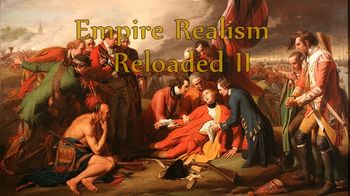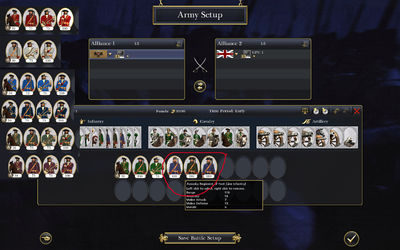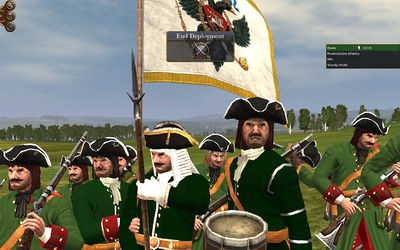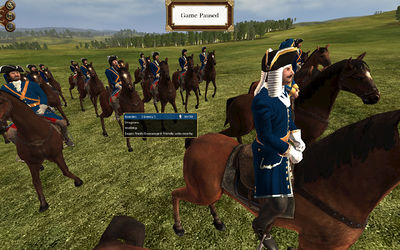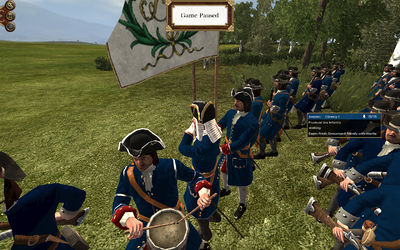Difference between revisions of "Empire Realism"
Tango12345 (talk | contribs) (→History) |
Tango12345 (talk | contribs) m (Quick-adding category "Empire Realism" (using HotCat)) |
||
| Line 107: | Line 107: | ||
[[Category:ETW Mods (Hosted)]] | [[Category:ETW Mods (Hosted)]] | ||
[[Category:TWC Hosted Modifications]] | [[Category:TWC Hosted Modifications]] | ||
| + | [[Category:Empire Realism]] | ||
Revision as of 03:48, 31 May 2017
| Empire Realism | |
|---|---|
| Platform: | Empire: Total War |
| Mod Type: | Total Conversion |
| Era: | Standard Empire: Total War Timeframe (1700-1800) |
| Mod Leader: | JaM |
| Release Status: | Empire Realism Reloaded II |
| Forum: | Here |
Empire Realism is a hosted mod for Empire: Total War which adds tweaks and other changes which are intended to enhance the realism and challenge of the Grand Campaign, and which make some significant gameplay changes towards realism and historical accuracy.
Contents
History
The mod was originally released in June/July 2009 by Davinci and was initially based on DarthMod Empire. It recieved a hosted forum of its own in October of that year. Under the leadership of JaM Empire Realism Reloaded II was released in August 2011, with a great many additional benefits over previous versions of the mod.
Features
In Short
- Reworked unit stats,weapons,fire drills (based on the system in Napoleon Empire Realism)
- Different military tactics for Nations - clear distinction between western and eastern military doctrine
- Richer naval experience - every ship type has its realistic use - small ships (Brigs, Sloops, Corvettes) are considered to be Privateers - they have 0 upkeep - blocking enemy trade lines with those ships adds profit to the crown. Due to higher movement radius, they are uncatchable by the Ships of the Line, so Frigates must be used for that (they have same movement radius)
- Naval stats adjusted so ships behave realistically, Large maindeck guns shoot double-shots at short distances, chasing long guns are able to cripple sails due to higher accuracy (chasing guns are placed only on prow), Ships of the Line are hard to sink, destroying guns and killing crews is the best way to disable them
- New damage textures for ships so they now dont look weird when shot at (no longer those big ugly squared holes)
- New radar map icons
- Upgraded Land Combat-Firing Drills have been removed for reasons of effectiveness (they caused bugs for the Battle AI). Instead (almost) all units use 2-rank volley fire. The only exceptions to this are Eastern nations and Native Americans who still use the less effective single rank fire with scattered mob formations. This actually allows them to fire with more men than with line formed single rank, but they are also not as disciplined nor as accurate. All soldiers in any unit will fire at will and not wait for everyone else in their rank to have reloaded.
Main Features
- Experience-this makes vital changes to the effectiveness of any unit. As one would expect the more experience points a unit has, the more effective it will become. The more experienced troops have higher morale and rate of fire. This is very important feat with 2 rank fire as experienced units are able to deliver salvos much faster-out-shooting and most likely decimating a less experienced enemy.
- Realistic Ballistics-musket fire is very effective at short ranges,while much less effective at the maximum range. This allows realistic 18th century tactics to be used to attract enemy fire at maximum range, while your unit can close up to short range before firing a devastating volley and then charging with bayonets fixed. These tactics will break less experienced troops, but must be used with caution against more experienced troops as they will be able to deliver sa econd salvo much faster which may cause terrible damage to your unit, after all it will be well within the enemy killing range.
- Realistic Artillery-there is a wide variety of artillery available from heavy 18-24 pounder batteries that are immobile on the battlefield to small light 3-6 pounder horse artillery. As was the case historically, the heavier guns have higher range and better accuracy, but they take much longer to reload, and because they are immobile can be vulnerable to attack by enemy cavalry if they are not adequately defended. Heavy artillery batteries also reduce the movement points of the army on the campaign map so they are not ideal for an offensive army unless it is intended for attacking and taking cities. 12 pounder heavy artillery is more mobile but is only available later in game after some technological development. Overall, while heavy artilleryy is more accurate and has more range, light artillery can fire 2-3 shots in the same time as heavy artillery can fire 1, meaning that the lighter, mobile artillery can take advantage of conditions that develop during a battle.
- Realistic cavalry-cavalry is now well suited for melee against scattered infantry, especially heavy cavalry which has high melee defense. Due to this fact, infantry units muct use squares to protect themselves, and must destroy the cavalry by superior firepower where the high melee defense values are not taken into account. There is also a clear distinction between east and western cavalry tactics-western cavalry does not fire from horseback, and instead can fire like skirmishers on foot. Eastern cavalry can fire from horseback.
- Realistic Technology- Eastern nations no longer have Western equipment. Indian factions and Middle Eastern/North African factions (to some degree) no longer have copycat western units and instead their units are unique. They do not have bayonets and flintlocks,instead they use matchlocks, sabres and swords. The only units that are armed with western weapons are units that get western-style training like Ottoman Nizaam units. Even then however, these units are not of the same standard as their western counterparts, even if the training is similar. This is intended to force the player to use historical and appropriate tactics with these armies, not simply using western style tactics.
- Realistic Naval Combat-The handling of naval vessels is more true to real life, where ships are not able to sail directly against the wind. The sailing speed is based on the type of ship and the technology level, so late era ships can outrun older models with ease. Maximum speed is also based on real historical data, with the same effet. The hull strength of a vessle also increased considerably as it gets bigger. Naval gunnery has been changed with new types of ammunition-standard solid shots which deal highest damage based on the caliber of the waepon (the damage formula is linear, so a 12 pounder will deal twice as much damage than a 6 pounder!)and short range ammo, where heavy guns (18 pounder and heavier) fire short ranged double shotted broadsides and light guns fire grapeshot. The double shots have slightly lower penetration than standard roundshots,but will cause more havoc due to the 2 rounds fired. Also the accuracy of doubleshot is very limited. The last ammunition type is to be used against enemy sails and rigging- again the damage very much depends on the gun type-heavy guns fire solid shots with higher angle, so they have longer range, but with less of an effect on the sails. Light guns fire chain-shot which isare very innacurate and have limited range but cause much more damage to the sails and rigging. A special category is the long range chasing guns which have very high accuracy (using roundshot) and increased sail damage (to represent better aimed "critical shots"). Obviously however these weapons are only mounted at the bow and stern of a ship, so one must use the ship wisely in order to get the best possible use out of them. Morale plays a very important role-dead crew, destroyed guns and hull damage are now crucial-once they are very high, the ship will surrender-as in reality. That said a very experienced crew will fight much longer even against impossible odds. Firing into the bow or stern of an enemy vessel ("raking") has a massive effect. Last, but not least, there are new damage textures to improve the visuals during the battles.
- Realistic Naval Campaigns-every ship type in the game plays its historical purpose-there are four groups-Ships of the Line, Frigates, Corsairs/Privateers and Traders.
- Ships of the Line have the best trained crews, strongest hulls and are very stable guns platforms. They do not have very many movement points so are best used against enemy fleets or ports. Only the brown water navies are able to recruit small flagships-major navies can only recruit the 1st Rate flagships. New marks of Ships of the Line can be unlocked later in the game.
- Frigates have twice as many movement points as ships of the line and are very good for patrolling and attacking pirates as well as convoy duty. They can easily outrun larger vessels. Again, upgraded versions are available later on in the game.
- Corsairs and Privateers have similar movement points to frigates, but no upkeep, so are very profitable to raid trade routes. That said, they are weaker than frigates and so may be vulnerable.
- Traders have more movement points than ships of the line, but less tghan frigates or privateers. They are useless in combat so must be escorted by warships.
Doctrine
Western
Western Infantry is formed into tighter formations than in the vanilla game. These units are able to form square and fight in melee with bayonets as normal. They are also more disciplined than for Native American, Eastern and Indian equivalents. Western cavalry is formed into 2-3 ranks again as well as tight formations, making cavalry charges highly lethal if timed correctly. Most of the units use heavy cavalry swords or sabres, but some use lances as well. These are very powerful on the charge, but weak in a protracted melee. Western artilery is represented for reasons of simplicity by standard calibres used at that time (though in actuality artillery was far from standard), and as the campaign moves on more mobile horse artillery will become available.
Eastern
Eastern military doctrine is based on older drills than their western counterparts- For example Ottoman Janissaries will still represent a medieval warrior force, using ranged weapons as a suplemental option to their swords. They also fight in deeper fomations firing from first rank only. That said, as mentioned previously some western style units are available such as the Ottoman Nizam Infantry. Similar to the infantry, the cavalry also fight in the medieval style-they will charge in disorderly columns trying to overwhelm the enemy. Without any advanced cavalry drill they will be relativly easy prey for professional western cavalry in a protracted melee or counter charge.Eastern Artillery is composed mostly of heavy fixed pieces, which will make Eastern armies very slow to move on campaign map.
Native American
Their units are no match against western infantry in open terain, but they do have other benefits-their bowmen are able to hide anywhere and shoot without being spotted, the melee troops thanks to lightweight weapons will be able to move fast, which makes them very deadly when charging into reloading infantry (especialy from the flanks or rear.)
Weapons
Standard flintlock will be able to fire 2 rounds per minute, elite units with high experience will be able double that. obsolete matchlock muskets will be able to fire one round every 45 seconds, but will have higher lethality than flintlocks due to larger projectiles (0.9 vs 0.8). Bows will be the fastest shooting weapons with rate of fire 10-12 arrows per minute. their dissadvantage will be low lethality in comparation to gunpowder weapons (0.25 vs 0.8), but together with other abilities like hiding in long grass and stealth firing they will have its place on battlefield. Just dont expect them to survive long in head on duels at short ranges (50m) against western Line Infantry...
Artillery
- Howitzers can fire solid shots at medium ranges directly, explosive or special shells indirectly at long range and later even canister (again direct trajectory). Explosive shells will have reduced amount of splinters and lower accuracy so they will be usable only in larger numbers (for example 2-3 batteries firing at a single target).
- Direct fire artilery has been adjusted as well - the larger the gun, the more accurate the gun will be, and the greater range it will have, but reloading will be slower. Small guns (3-6 pounders) will be able to fire 2-3 shots in time a heavy battery can fire one salvo, which will make light guns very useful for their rapid reactions, but once you start using them in an artillery duel at longer ranges they will have no chance against heavy pieces.
New unit structure
- Empire Realism should be played with the unit multiplier on x2. This is important as all units now represent Regiments, Battalions and Companies in keeping with the list below:
- Regiment - 320 men (160 without multiplier) - All Line infantry units will be represented as regiments.
- Battalion - 160 men (80 without multiplier) - Specialist troops will be formed into Battalions - Grenadiers, Light Infantry, etc.
- Companies - 80 men (40 without multiplier) - Other specialists units - this sub-unit is used for all Skirmisher units armed with rifles or bows. Even with lower numbers, they are much harder to hit thanks to open formation and making use of the terrain (smaller silhouette value will make them harder to get hit by musketry). This formation does representing a company per se, but several detached companies of skirmishers.
- Several eastern units may have different numbers, especially theirregulars.
- For Western Cavalry every unit represents two cavalry squadrons. Cavalry units are formed into 2-3 rank formations. Units which are able to fire from horseback on the move will only get a limited amount of ammunition (2-4 bullets to symbolize carbine and several cavalry pistols) as it was practically imposible to reload a carbine on a horse during a battle. As well as this, normal ranged weapons were practically never used in cavalry combat in large numbers. Of course, bow armed cavalry is the exception, almost all Eastern cavalry units will not use closed 2-3 rank formations, but more open ones more suitable for their behavior on the battlefield.
The Team
- DaVinci (mod founder, former mod leader)
- JaM (mod leader)
- Thorn
- Shaggy1973
- Lord Zimoa
- vonPeretz
